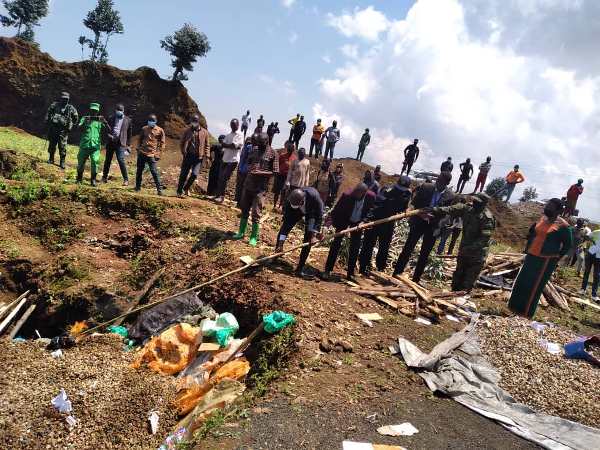
Rwanda National Police (RNP) has continued to make headways against drug trafficking rings in Rubavu, one of the identified major trafficking routes from the neighbouring Democratic Republic of Congo (DRC).
In the Police operations conducted between February and August this year, RNP seized over 501, 600 pellets of cannabis from dealers, weighing 627kgs.
Also seized during the six-month operations include 523 sachets of Simba and 11 litres of Kanyanga, both banned illict gin and classified as psychotropic substances in Rwanda.
The narcotic drugs and psychotropic substances valued at over Frw100.8 million, were disposed of on Monday, August 23, in Nyakiliba Sector, Gikombe Cell, Nyabibuye Village.
The public destruction exercise was presided over by local leaders, security organs, RIB and prosecution as well as few local residents to abide by the national Covid-19 prevention protocol.
According to the District Police Commander (DPC) for Rubavu, Senior Superintendent of Police (SSP) Aphodis Gashumba, majority of the narcotics were seized from traffickers and dealers in Bugeshi and Busasamana sectors.
The two sectors lie on the borderline with the DRC and dealers use porous border points to easily sneak the narcotics into Rwanda.
“These are big quantities of narcotics seized in a short period–six months–and this was largely the impact of community policing. Because of the responsiveness of the public, we were able to know the identities of rackets involved, tricks they employ, trafficking routes and hide-outs,” SSP Gashumba said.
Deogratias Nzabonimpa, the vice mayor for Rubavu in charge of Finance and Economic Development embarked on the harmful side of abusing drugs and how it affects economic development.
“Millions of money were wasted in buying these narcotics instead of investing it in legal businesses to support families and contribute to the country’s development. The end result is long-term imprisonment which is another blow to dependants,” said Nzabonimpa.
According to medical experts, abusing drugs causes, among others, mental illness, heart, liver and kidney complications.
Nzabonimpa urged residents to continue sharing information on dealers and to support national efforts in breaking chains of supply. (End)
